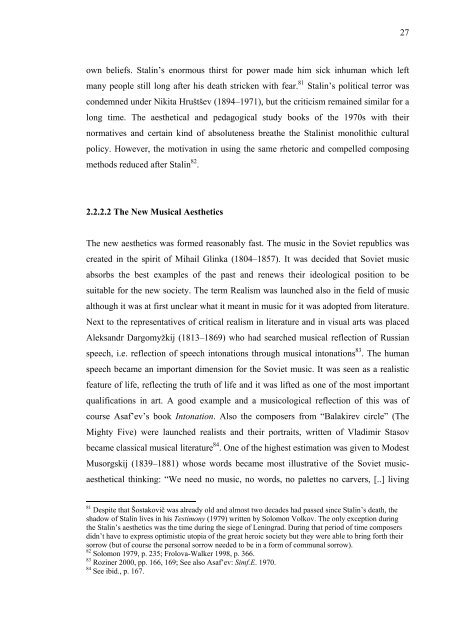Boris Asaf'ev and the Soviet Musicology - E-thesis
Boris Asaf'ev and the Soviet Musicology - E-thesis
Boris Asaf'ev and the Soviet Musicology - E-thesis
You also want an ePaper? Increase the reach of your titles
YUMPU automatically turns print PDFs into web optimized ePapers that Google loves.
own beliefs. Stalin’s enormous thirst for power made him sick inhuman which left<br />
many people still long after his death stricken with fear. 81 Stalin’s political terror was<br />
condemned under Nikita Hruštšev (1894–1971), but <strong>the</strong> criticism remained similar for a<br />
long time. The aes<strong>the</strong>tical <strong>and</strong> pedagogical study books of <strong>the</strong> 1970s with <strong>the</strong>ir<br />
normatives <strong>and</strong> certain kind of absoluteness brea<strong>the</strong> <strong>the</strong> Stalinist monolithic cultural<br />
policy. However, <strong>the</strong> motivation in using <strong>the</strong> same rhetoric <strong>and</strong> compelled composing<br />
methods reduced after Stalin 82 .<br />
2.2.2.2 The New Musical Aes<strong>the</strong>tics<br />
The new aes<strong>the</strong>tics was formed reasonably fast. The music in <strong>the</strong> <strong>Soviet</strong> republics was<br />
created in <strong>the</strong> spirit of Mihail Glinka (1804–1857). It was decided that <strong>Soviet</strong> music<br />
absorbs <strong>the</strong> best examples of <strong>the</strong> past <strong>and</strong> renews <strong>the</strong>ir ideological position to be<br />
suitable for <strong>the</strong> new society. The term Realism was launched also in <strong>the</strong> field of music<br />
although it was at first unclear what it meant in music for it was adopted from literature.<br />
Next to <strong>the</strong> representatives of critical realism in literature <strong>and</strong> in visual arts was placed<br />
Aleks<strong>and</strong>r Dargomyžkij (1813–1869) who had searched musical reflection of Russian<br />
speech, i.e. reflection of speech intonations through musical intonations 83 . The human<br />
speech became an important dimension for <strong>the</strong> <strong>Soviet</strong> music. It was seen as a realistic<br />
feature of life, reflecting <strong>the</strong> truth of life <strong>and</strong> it was lifted as one of <strong>the</strong> most important<br />
qualifications in art. A good example <strong>and</strong> a musicological reflection of this was of<br />
course Asaf’ev’s book Intonation. Also <strong>the</strong> composers from “Balakirev circle” (The<br />
Mighty Five) were launched realists <strong>and</strong> <strong>the</strong>ir portraits, written of Vladimir Stasov<br />
became classical musical literature 84 . One of <strong>the</strong> highest estimation was given to Modest<br />
Musorgskij (1839–1881) whose words became most illustrative of <strong>the</strong> <strong>Soviet</strong> musicaes<strong>the</strong>tical<br />
thinking: “We need no music, no words, no palettes no carvers, [..] living<br />
81 Despite that Šostakovič was already old <strong>and</strong> almost two decades had passed since Stalin’s death, <strong>the</strong><br />
shadow of Stalin lives in his Testimony (1979) written by Solomon Volkov. The only exception during<br />
<strong>the</strong> Stalin’s aes<strong>the</strong>tics was <strong>the</strong> time during <strong>the</strong> siege of Leningrad. During that period of time composers<br />
didn’t have to express optimistic utopia of <strong>the</strong> great heroic society but <strong>the</strong>y were able to bring forth <strong>the</strong>ir<br />
sorrow (but of course <strong>the</strong> personal sorrow needed to be in a form of communal sorrow).<br />
82 Solomon 1979, p. 235; Frolova-Walker 1998, p. 366.<br />
83 Roziner 2000, pp. 166, 169; See also Asaf’ev: Simf.E. 1970.<br />
84 See ibid., p. 167.<br />
27

















